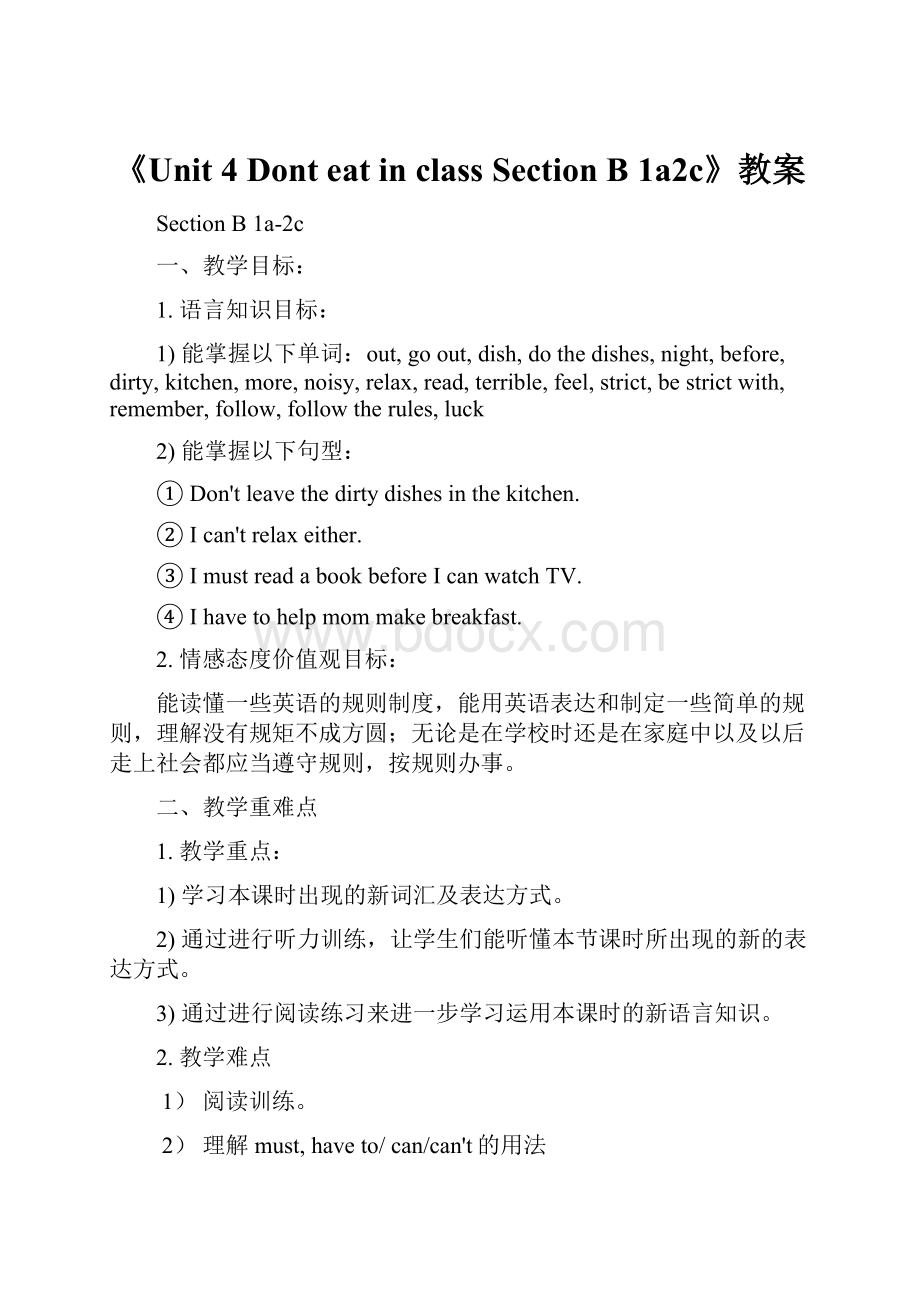《Unit 4 Dont eat in class Section B 1a2c》教案.docx
《《Unit 4 Dont eat in class Section B 1a2c》教案.docx》由会员分享,可在线阅读,更多相关《《Unit 4 Dont eat in class Section B 1a2c》教案.docx(11页珍藏版)》请在冰豆网上搜索。

《Unit4DonteatinclassSectionB1a2c》教案
SectionB1a-2c
一、教学目标:
1.语言知识目标:
1)能掌握以下单词:
out,goout,dish,dothedishes,night,before,dirty,kitchen,more,noisy,relax,read,terrible,feel,strict,bestrictwith,remember,follow,followtherules,luck
2)能掌握以下句型:
①Don'tleavethedirtydishesinthekitchen.
②Ican'trelaxeither.
③ImustreadabookbeforeIcanwatchTV.
④Ihavetohelpmommakebreakfast.
2.情感态度价值观目标:
能读懂一些英语的规则制度,能用英语表达和制定一些简单的规则,理解没有规矩不成方圆;无论是在学校时还是在家庭中以及以后走上社会都应当遵守规则,按规则办事。
二、教学重难点
1.教学重点:
1)学习本课时出现的新词汇及表达方式。
2)通过进行听力训练,让学生们能听懂本节课时所出现的新的表达方式。
3)通过进行阅读练习来进一步学习运用本课时的新语言知识。
2.教学难点
1)阅读训练。
2)理解must,haveto/can/can't的用法
三、教学过程
Ⅰ.Warming-upandrevision
1.GreettheSs.
2.Checkthehomework.LetsomeSsreadtheirhomerules.
3.你知道这些规则的意思吗?
Don’truninside.
Don’tpush.
Don’tlitter.
Saveelectricity.
Savewater.
Ⅱ.Presentation
1.ShowsomepicturesonthebigscreenandletSslearnthenewwordsandexpressions.
2.学生看着1a部分的图片
___goout
___seefriends
___dohishomework
___practicetheguitar
___dothedishes
___watchTV
___helphismommakebreakfast
___cleanhisroom
T:
Whatdayisittoday?
Ss:
It’sTuesday.
T:
Theboyisgoingoutonschoolnights.(板书,教读)
学生理解“schoolnights”的含义。
Canyougooutonschoolnights?
Ss:
No,wecan’t.
T:
Yes,inChina,thestudentscan’tgooutonschoolnights.
Sopleasedon’tgooutonschoolnights.
3.请学生朗读1部分的“rules”,并将图片a~h的序号填写在1b这些规则前的方框中。
4.Checktheanswerswiththeclass.
Ⅲ.Listening
1.TellSsthey'lllistentotherecordingaboutDave'shouserules.Listenandputan×forthingsDavecan'tdoanda√forthingshehastodo.
RulesCan’tHaveto/must
goout
seefriends
dohishomework
practicetheguitar
dothedishes
watchTV
helphismommakebreakfast
cleanhisroom
2.PlaytherecordingfortheSstolistenandcheck.
3.PlaytherecordingagainfortheSstochecktheanswers.
Ⅳ.Listening
1.Nowlet'sworkon1c.Nowfirst,let'sreadthephrasesaloudtogether.
RulesWhen
goout
seefriends
dohishomework
practicetheguitar
dothedishes
watchTV
helphismommake
breakfast
cleanhisroom
2.Explainthemeaningofthephrasesifnecessary.
3.PlaytherecordingthreetimesfortheSstolistenandwritethephrasesinthechartin1b.
(指导:
听一遍时应仅听,不写,并听准确与每个活动相关的时间。
然后,在听第二遍时,边听边做记录,可以用速记符号来词;也可用单词开头的字母来作记录。
最后,整理自己的记录,写成正确的词组。
最后一遍,听并检查所记录的词组是否正确。
)
4.Checktheanswers:
5.Makeaconversationwithyourpartner.
A:
Hi,_____.Doyouwantto________.
B:
...Ican’t_____________.
A:
Oh,that’stoobad.
B:
Yeah,Ihavesomanyrules…
A:
Really?
B:
Yeah,Ican’t_____________________.
A:
Whatotherrulesdoyouhave?
B:
Mmm…Imust________________.
A:
Oh.Well,Ihaveto_____________.
B:
Me,too.Ihaveto_______________.
A:
Wow,youdohavealotofrules!
Ⅴ.Groupwork
1.DividetheSsintogroups.Eachgrouphaseightstudents.
2.T:
Nowlet'stalkaboutDave'shomerules.
3.Ssworkingroups.Everystudentcansayonerule.Thenyoucanwritedownwhattherulesarewhenothergroupmemberssay.
4.MakealistofDave'shouserules.
Ⅵ.Thinking
1.T:
Everybodymayhavesomethingunhappy.Whenyouareunhappywhodoyouliketotalkto?
S1:
Iliketotalktomyaunt.
S2:
Iliketotalktomybestfriend.
S3:
Iliketotalkto…
T:
OK.Doyouknow,whenI'munhappyIliketotalktoDr.Know.She'sgreatandheknowseverything.Shecangiveyouthebestadvice.Now,let'sworkon2aandlet'smeetDr.Know.
Ⅶ.Presentation
1.Showsomepicturesonthebigscreen.TeachSsthenewwordsandexpressions.
dirty,dishes,kitchen,noisy,relax,terrible,read,feel,strict,bestrictwith
2.Sslearnthenewwordsandexpressionsandtrytorememberthem.
Ⅷ.Reading
1.Fastreading
T:
TherearemanyrulesinMolly'shomeandschool.Shefeelsunhappy.Readtheletterandfindtheanswertothisquestion:
WhatdoesMollyfeelabouttherules?
Ssreadtheletterandfindtheanswertothisquestion.
(shefeelsterrible.)
2.Carefulreading
1)ReadtheletteragainandunderlinetherulesforMolly.
2)SsreadtheletterandtrytofindtherulesforMollyandunderlinethem.
3)Checktheanswerswiththeclass.
(LetsomeSsreadtheiranswersaloud.LetotherSsaddsomerules.)
3.Carefulreading
1)ReadDr.Know'sletterandanswerthisquestion:
Whatdoesshethinkoftheschoolandhomerules?
2)SsreadDrKnow'sletterandfindtheanswertothisquestion.
3)Letonestudentreadouthis/heranswer.
(Shethinksparentsandschoolsaresometimesstrict,buttheymakerulestohelpus.Wehavetofollowthem.)
Ⅸ.Reading
1.Workon2c.Readtheletteragainandcompletethesentenceswithhaveto/must,canorcan't.
1.Molly____playbasketballonschooldays,butshe___playitonweekends.
2.Molly____doherhomeworkfirstwhenshegetshome.
3.Molly____readabookafterdinnerbeforeshe___watchTV.
4.Atschool,Molly_____benoisyoreatinclass.
5.Parentsandschoolsmakerulestohelpstudents.Sostudents______followtherules.
3.阅读指导:
1)首先,认真阅读2c中的这些句子,明白它们所谈论的相关规则。
2)带着相关规则再去读2a中的信,在与之相关的内容处认真分析,理解规则的真正含义,并填上正确的词汇。
3)再次阅读这些句子一遍,看是否通顺。
4.Checktheanswers.
5.求助信的特征和语言。
1)书信称呼都是用Dear…
2)称呼后用逗号,不用冒号,这是中英文信件区别之处。
3)求助信中第一句是核心句,例如Therearetoomanyrules!
主题句后就是解释说明主题句的细节句。
4)信件结束前一般会有明确求助的句子,即WhatcanIdo?
Ⅹ.Languagepoints
1._________theguitar练习吉他
practicev.意为“练习”后面可跟名词、代词或动名词。
e.g.ImustpracticeEnglisheverymorning.
我每天早晨必须练习英语。
Mr.XupracticesdoingKongfueveryday.许先生每天练习功夫。
2.DearDr.Know
Dr.为doctor(博士;医生;医师)一词的缩写形式,放于姓氏之前,表示对人的尊称。
Dr.采用的是首尾缩写法,取首字母和词尾字母将单词进行缩写。
3.Getupnowandmakeyourbed?
makethebed/makeone’sbed整理床铺
e.g.你会整理床铺吗?
Canyou______________?
鲍勃总是自己整理床铺。
Bobalways___________________.
4.Don’tbenoisy.翻译:
___________________。
noisyadj.意为“吵闹的”
e.g.Wecan’tbenoisyinclass.
我们不能在教室里大吵大闹。
5.Afterdinner,Ican’trelaxeither.
翻译:
_______________________。
副词either表示“也”,用于否定句句末,用法与表示肯定或陈述的副词too相似,可用逗号与语句的主题隔开。
e.g.YoulikeEnglish.Ilikeit,too.
你喜欢英语,我也喜欢。
Myfathercan’tspeakEnglish.Mymothercan’t(speakit),either.
我爸不会讲英语,我妈也不会。
6.ButIhavetogobebedbefore10:
00.
before在……之前;after在……之后;它们的后面可以跟表示时间的点,也可以跟一个从句表示时间。
e.g.Washyourhands_____________.饭前洗手。
Doyourhomework___________.放学后做作业。
Brushyourteethbeforeyougotobed.睡觉前刷一下牙。
Mrs.Wuusuallymakesdinnerforthefamilyfirstaftershegetshome.
吴太太在到家之后通常先为家人做饭。
7.Parentsandschoolsaresometimesstrict,…
bestrict_________(对某人)严格的
bestrict____________对某事要求严格
e.g.Ourmathteacherisverystrict.
我们的数学老师很严格。
Areyourparentsstrictwithyou?
你的父母对你严格吗?
Thegirlisverystrictindoingthework.这个女孩对工作要求严格。
8.Therearealotofthingsyoucando.
有许多你可以做的事情。
alotofthingsyoucando是一个名词短语,句子youcando起着修饰,限定名词things的作用。
当句子限定修饰名词时要放在该名词之后。
e.g.Therearealotofsongsyoucansing.
有许多歌曲你可以唱。
9.haveto&must
haveto意为“不得不”,表示客观上的必要性,有人称和数的变化,其后要跟动词原形,其否定式don’t/doesn’thaveto表示“不必”。
must意为“必须”,强调说话人的主观看法,没有人称和数的变化,其后要跟动词原形,其否定式mustn’t表示“不准;禁止”。
含有haveto和must的句式如下:
haveto
must
肯定式
主语+have/hasto+动词原形+其他.如:
·Ihavetogonowbecauseit’slate.
主语+must+动词原形+其他.如:
·Wemustfinishthework.
否定式
主语+don’t/doesn’t+haveto+动词原形+其他.如:
•Mikedoesn’thavetocomebefore7:
00a.m.
主语+mustn’t+动词原形+其他.如:
·Youmustn’trunhere.
疑问式
Do/Does+主语+haveto+动词原形+其他?
如:
·DoesMikehavetocomebefore7:
00a.m.?
Must+主语+动词原形+其他?
如:
·Mustwefinishthework?
【运用】
Ⅰ.将下列句子翻译成英语。
1.汤姆(Tom)不得不离开这个村庄。
_____________________________________
2.我必须打扫这个房间。
_____________________________________
Ⅱ.根据括号内的要求完成下列各题,每空一词(含缩略形式)。
1.Wehavetogotothebusstation. (改为否定句)
We__________gotothebusstation.
2.Imustdomyhomeworknow. (改为一般疑问句)
_____you__yourhomeworknow?
Ⅺ.Exercises
Ⅰ. 根据句意及所给首字母提示,补全句中所缺单词。
1.Kate,yourshoesare d .Brushthemtoday.
2.Ihopethisgift(礼物)willbringyougood l .
3.Ican’tworkherebecauseit’sso n .
Ⅲ. 根据汉语意思完成英语句子,每空一词(含缩略形式)。
1. 你们必须遵守规则。
Youmust__________________________.
2. 你每天自己铺床吗?
Doyou___________________________byyourselfeveryday?
3. 这个房间人太多了。
Thereare__________________peopleintheroom.
4. 王老师对她的学生要求严格。
MissWang___________________________herstudents.
5. 哦,我感觉糟透了。
Oh,I__________________.
6. 别把你的书包落在图书馆。
__________________yourschoolbaginthelibrary.
Ⅻ.Homework
一.熟读两封英语信。
二.用下列词汇造句。
1.toomany2.makeone’sbed
3.belatefor4.after…
5.before…6.haveto…
7.bestrictwithsb.